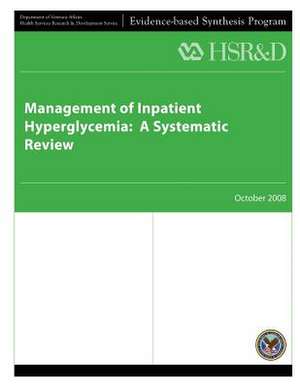Management of Inpatient Hyperglycemia
Autor U. S. Department of Veterans Affairs, Health Services Research &. Deve Serviceen Limba Engleză Paperback
Preț: 110.36 lei
Preț vechi: 116.16 lei
-5% Nou
Puncte Express: 166
Preț estimativ în valută:
21.12€ • 22.10$ • 17.58£
21.12€ • 22.10$ • 17.58£
Carte disponibilă
Livrare economică 10-24 martie
Preluare comenzi: 021 569.72.76
Specificații
ISBN-13: 9781490363844
ISBN-10: 149036384X
Pagini: 80
Dimensiuni: 216 x 280 x 4 mm
Greutate: 0.21 kg
Editura: CREATESPACE
ISBN-10: 149036384X
Pagini: 80
Dimensiuni: 216 x 280 x 4 mm
Greutate: 0.21 kg
Editura: CREATESPACE
